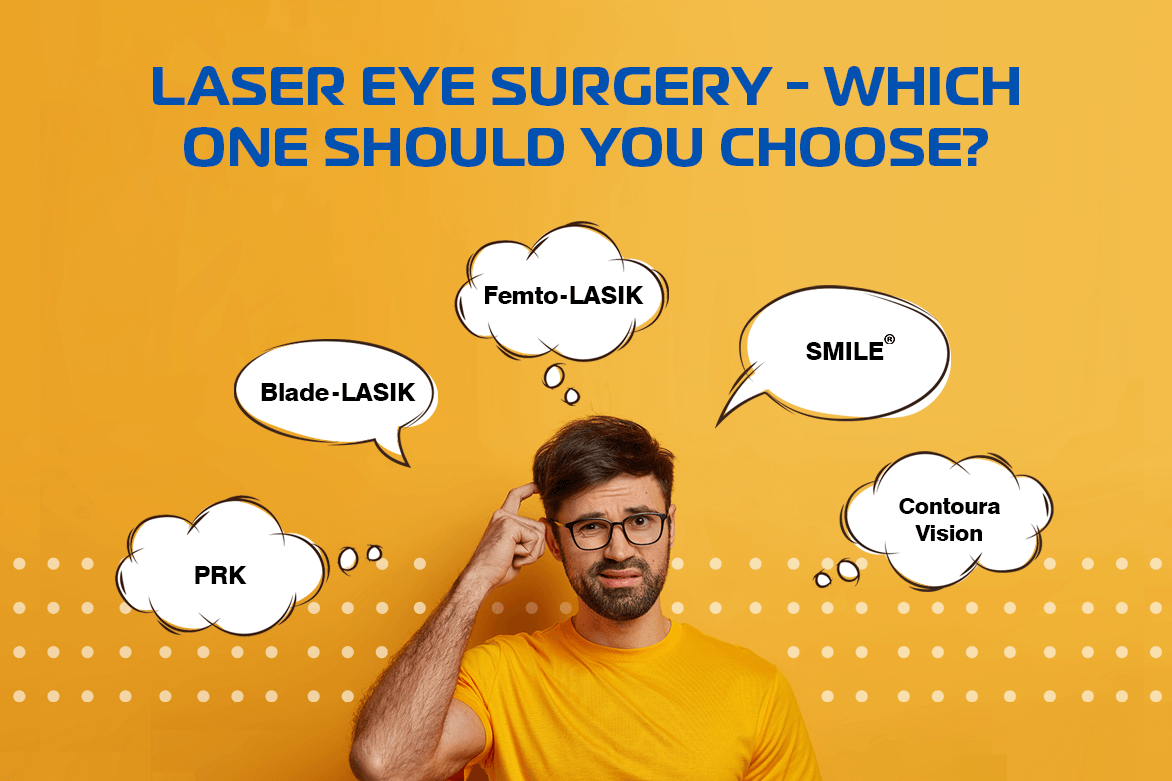
Types of Laser Eye Surgeries

Types of Laser Eye Treatment – Which one should you choose?
On hearing or reading the term ‘laser eye surgery’ most people may think that there is just one technique that is there for all. It is a common myth or misconception that there is just one type of laser eye treatment. There is no one standard laser eye surgery which fits all. Every eye is unique and so are their needs. With consistent advancements in eye care technology, corrective eye surgery has also evolved. Laser eye surgery is used as a common term for refractive or spectacle removal. Such surgeries can correct conditions like myopia (nearsightedness), hyperopia (farsightedness), astigmatism, and presbyopia.
What is Laser Eye Surgery?
Laser eye surgery refers to a range of surgical procedures that use laser technology to correct vision problems. These procedures are designed to reshape the cornea, the clear front surface of the eye, in order to improve how the eye focuses light onto the retina, thus enhancing vision. Laser eye Surgery is one of the safest and most commonly performed eye surgical procedures. There are several types of laser Eye Surgery that can improve your eyesight and eye health and lower surgical costs. Let’s look at the major types of laser eye surgeries in this detailed guide.
Types of Laser Eye Treatment
There are several types of laser eye treatments available to correct vision problems. Some common types include:
- PRK (Photorefractive Keratectomy)
In this procedure, the eye surgeon uses a laser to correct refractive error by correcting the shape of the cornea. PRK can treat farsightedness, nearsightedness, and astigmatism. The procedure aims at getting you rid of eyeglasses or contact lenses, or at least reducing the dependence on them reducing the dependency on eyeglasses or contact lenses.
- ASA (Advanced Surface Ablation)
It is also known as Photorefractive Keratectomy (PRK). In this type of laser eye surgery, anesthetic eye drops (numbing eye drops) are used and then the outer layer of the
cornea is safely removed with the help of a softening agent.
- Blade LASIK
This is the standard or traditional LASIK that has been prevailing since the 90s. For this specs removal procedure, a microkeratome (blade to use on the cornea) is used by the surgeon to create a corneal flap. The corneal flap is lifted so that the laser can reshape the cornea and correct the vision.
- Femto LASIK (Laser-Assisted In Situ Keratomileusis)
Thi type of laser eye surgery is a highly effective and advanced form of LASIK to correct vision problems. It is also known as all-laser or bladeless LASIK. Two lasers are used in this procedure, femtosecond and excimer laser. Owing to its high precision and safety, Femto LASIK treatment enables the eye surgeon to remove eye power safely.
- SMILE (Small Incision Lenticule Extraction)
Also known as ReLEx (Refractive Lenticule Extraction), it is the most advanced type of laser vision correction procedure. It is a minimally invasive surgery which corrects nearsightedness (myopia) with excellent results. In addition to myopia, SMILE can also treat astigmatism (cylindrical eye power up to 5 diopters).
- Contoura Vision
It is an FDA-approved cutting edge technology which is customized by marking 22,000 unique elevation points as per the corneal topography or surface. And thus, it is also known as topography-guided LASIK procedure which is highly sophisticated. The laser is fired to remove corneal irregularities and correct refractive error. Once done with the procedure, a person experiences improved visual sharpness.
This must have given you clarity on laser eye surgery types. As it is clear that no two individuals have the same eyes and different factors. Thus, while taking a major decision related to your eyes, only trust an experienced eye specialist.
Other Conditions where Different Types of Laser Surgery Works:
- Femto Laser-Assisted Cataract Surgery (FLACS): It is an advanced cataract removal procedure which is simplified and minimally invasive. It is quite precise and the incision required on the cornea is guided through a unique imaging system. This incision is blade-free and only laser assisted. In this technique, the initial complex steps involved in the cataract removal are mechanized and the laser aids in softening the cataract. Furthermore, the laser can also correct mild astigmatism.
- Glaucoma Treatment: Laser treatment is helpful in treating certain types of Glaucoma. For instance, a laser treatment called trabeculoplasty can treat open angle Glaucoma. The procedure aims at allowing the fluid in the eye to drain which helps in lowering the pressure inside the eye.
Are these Laser Eye Surgeries Safe and Effective?
Laser eye surgeries are considered safe and effective for the vast majority of patients. However, all these types of laser eye surgery come with some potential risks and side effects that individuals should be aware of. Here’s an overview of the safety and effectiveness of these procedures:
- High Safety Profile: Laser eye treatments have a high safety profile, and the vast majority of patients achieve successful outcomes with minimal complications.
- Possible Complications: Though rare, potential complications can include dry eyes, glare, halos, under or over-correction, infection, and issues related to the corneal flap.
- Patient Screening: Proper patient screening and selection are crucial to ensure the safety and success of the procedure. Individuals with certain eye conditions, unstable prescriptions, or health issues may not be suitable candidates for these surgeries.
- Skilled Surgeons: The experience and skill of the surgeon play a significant role in the safety and success of the surgery.
How can you choose Type of laser eye surgery which is just right for your eyes?
Different types of laser eye surgery have different behavior and recovery time. Which type of laser eye surgery you should go for depends upon several factors:
- Above 18 years of age
- Good eye health
- Thickness of the cornea
- Pupil size
- Stability of vision
- Overall well being
- Have realistic expectations
Your eye specialist will assess these factors and based on your overall eye health, they will recommend you the best-suited laser eye surgery.
Final Word
To fully know about your eyes and if there is any underlying problem along with refractive error, get a detailed eye checkup. To set yourself from the limitations of eyeglasses, visit an eye specialist today. It’s not up to the patient to decide any random procedure without going through pre-refractive workup. To get your advanced treatment, get in touch with PLANET LASIK by Centre For Sight. You can rely on our doctors’ advice and go ahead with the treatment. To book your consultation, log onto https://www.planetlasik.com/
